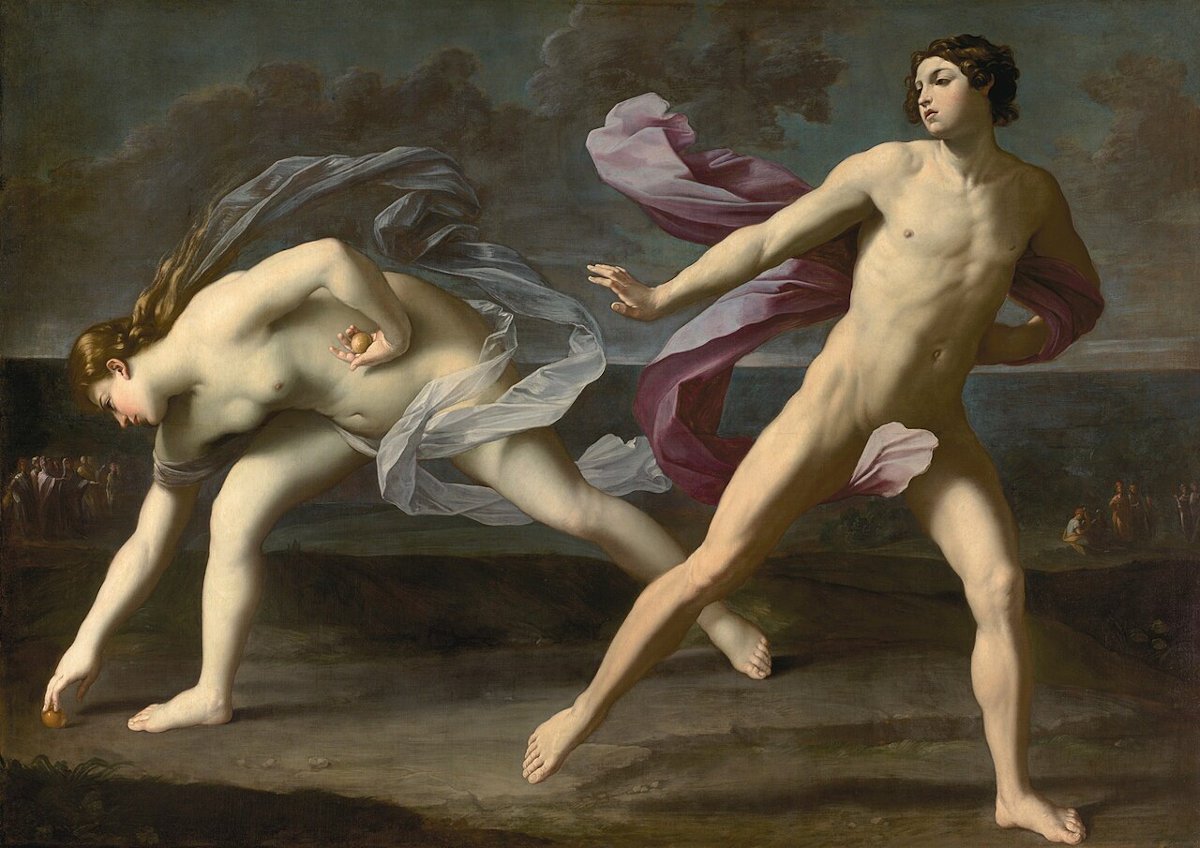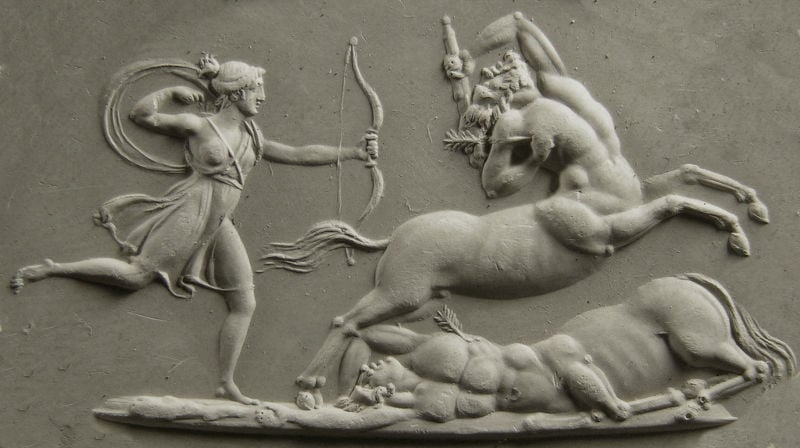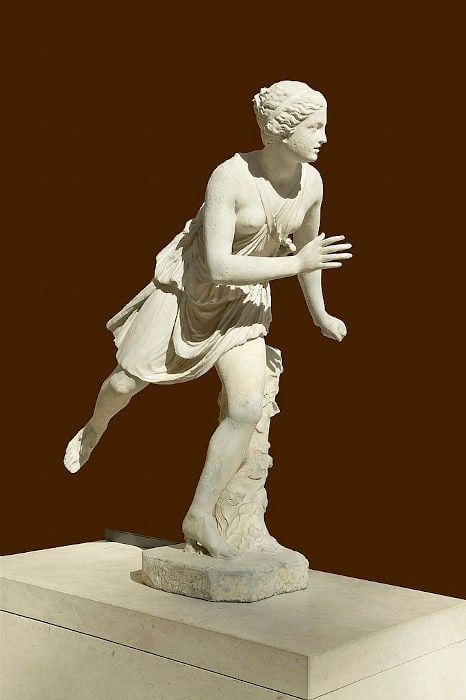
Wild and Free: The Empowering Myth of Atalanta and its Significance
Upon the verdant slopes of Mount Parthenium, among the thicket of dense wood and secluded caves, a fragile infant lay abandoned. Her Arcadian father, Iasus, desperately wanted sons but was gifted a baby girl. His discontent led him to order her left to die, alone and exposed. But the man tasked with her untimely demise did not have it within him to kill her; instead, he traveled to the mountain, gently placing her near a clear spring. Fortune would smile on this forsaken child, as shortly thereafter, a bear, grieving the loss of her cubs to hunters, approached the spring. Still heavy with milk, and guided by a divine instinct, the mother bear nurtured the abandoned child, offering her sustenance and solace. In this miraculous bond, the bear found relief from her grief, while the infant thrived under her care.
- Divine, Forbidden and Dangerous? Magic Apples in Ancient Mythology
- Amazons in the Family of Alexander the Great: Who Was the Mystery Woman Warrior?
The hunters, who had once pursued the bear, killing her children, took notice of the curious child, watching her and the mother bear’s movements from afar. When the chance arose, they stole her away, claiming the child as their own. Raised in the mountains, forged by wilderness, she grew agile and strong. Even in her youth, she stood taller and more striking than any full-grown woman of her time. Her gaze, fiery and intense, bore the mark of her uninhibited upbringing; she was beautiful and fearsome. Her limbs were honed by the relentless pursuit of game, as her golden hair shimmered in the sunlight and her sun-kissed complexion glowed. Encounters with her were rare, a fleeting vision, chasing wild beasts, darting through the underbrush, or engaging in fierce battles. She vanished into the shadows of the woods, leaving behind only echoes of her extraordinary spirit. Always dedicated to her goddess, Artemis, who ruled over the forest, and who she embodied in chaste, skill, and solitude, she was given a name, Atalanta, equal in weight. Her name would become a legend and a lasting symbol of rebellion and empowerment well beyond the Greek world.

An engraving of Atalanta killing the centaurs, Hyleos and Rhoecos. (Public Domain)
An Extraordinary Woman
At the end of a narrow pass, Atalanta dwelled in a deep cave; its entrance guarded by a steep drop. Ivy and grapes draped nearby Laurel trees, lush grass, vibrant crocuses and hyacinths bloomed; their sweet scents filled the air, creating a festive atmosphere. A cool and refreshing stream flowed by, nourishing the plants and enhancing the charm. Inside, Atalanta rested on animal skins from her hunts, living off their meat. She wore simple clothes that reflected her admiration for nature and her commitment to remain a virgin. Living a peaceful and quiet life, reluctant to mingle with any man, inevitably attracted admirers and a few foes her way.
On one such night, Atalanta was rudely awakened by the loud intrusion of two Centaurs, Hylaeus and Rhoecus. Their burning torches flashed through the trees as their ominous and weighty hooves trudged. They tore fresh branches from the trees to fashion crude garlands, unruly suitors, full of excitement, maniacally attempting to approach her with gifts meant for a wedding she had no desire for. The sight would have frightened anyone alone in the wilderness, but Atalanta stood her ground. She knew their true intentions from the moment she spotted their flames. Drawing her bow from the safety of her cave, she was determined to defend herself against their unwelcome advances. In an instant, she shot her weapon, mortally wounding one of the suitors. The other, now brimming with anger, raced towards her, but with little effect; she killed him just the same. A true testament to her bravery, Atalanta was not one to calmly submit.
Eventually, however, Atalanta would leave the tranquility of her home to embark on new adventures worthy of her skill. Jason, on his quest to find the golden fleece he so desperately needed to save his mother, and by advice given by an oracle of Athena, assembled a crew of fifty. Among the scrappy crew of the Argo was none other than Atalanta. Though Jason was apprehensive to bring a woman aboard, in fear of how the men would react or if she were a possible distraction, she was eager and her position well-earned. During a game commemorating Jason and his adventurers, Atalanta wrestled the great Peleus, father of Achilles, and triumphed. It was an unforgettable battle, one that drew attention and admiration.
Sometime later, in the wild and rugged land of Calydon, Artemis had unleashed a great terror, the Calydonian Boar. This beast was a terrifying sight, its eyes burned like coals, tusks sharp as daggers, and a body thick with muscle and bristle. It charged through the countryside, devastating fields and homes, leaving destruction at every turn. Heroes from far and wide gathered, ready to prove their valor. Among them stood Jason’s crew, but more importantly, Atalanta. Her hair was tied back, and her trusty bow rested in her hand. She was resolute, experienced, more than capable amongst the greatest of warriors. The air buzzed with anticipation as men strategized, spread nets, set dogs loose, and tracked any traces of the boar’s massive footprints through the dense woods. Each hero was driven by a mix of anxiety and exhilaration, further pushed by the presence of a woman, whom they refused to let outshine them. Atalanta, on the other hand, maintained her composure, focused on the task ahead.
When the beast finally charged with a roar that sent tremors through the earth, chaos erupted, and the men, filled with adrenaline, raised their weapons and shouted battle cries. Yet, it was Atalanta who remained steady. With her practiced hand, she fitted an arrow to her bowstring and released it. The arrow flew straight and true, striking the boar just beneath its ear. The creature stumbled, its blood staining the ground, and Atalanta felt a surge of victory, albeit short-lived. Meleager, the leader of the hunt and one that had been secretly doting since he set eyes on her, was the first to notice the impact of her shot. He called out to his companions, honoring her, which ignited a reciprocal flame within Atalanta. Not all the heroes responded with respect, jealousy brewed, and they could not bear the thought of her accomplishment.





